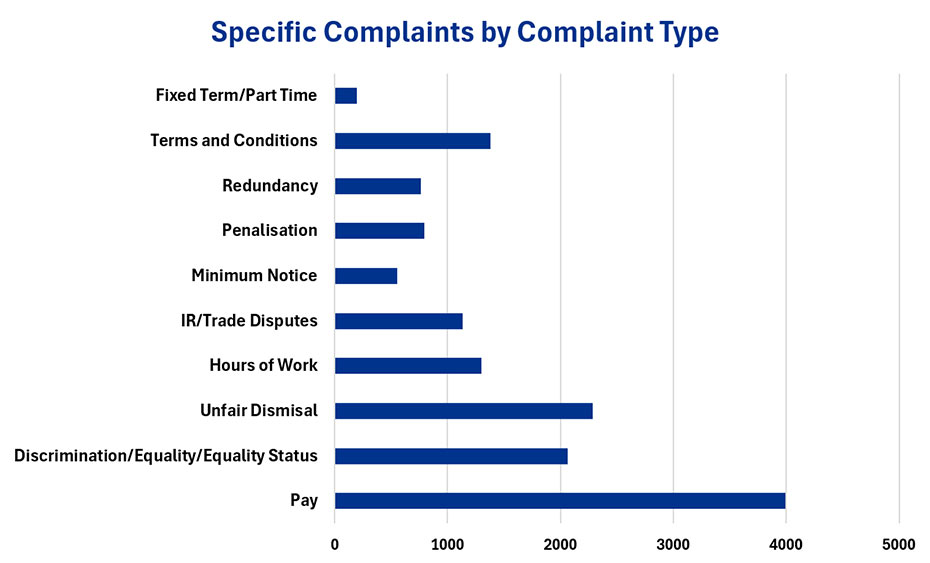22 May 2025
The Workplace Relations Commission (WRC) has released its Annual Report for 2024, showcasing a year of expanded services and impactful enforcement. The independent statutory body reported notable increases across its core functions, including inspection, adjudication, mediation, and information services.
The 2024 Annual Report highlights a broad increase in engagement with the WRC’s services. Employer inspections rose by 9%, while the amount recovered in unpaid wages climbed by 10%. Although the number of adjudication hearings saw only a slight increase of 0.3%, the volume of mediations delivered grew significantly, up by 14%. The WRC also continued its proactive campaigns, focusing on national minimum wage compliance and awareness. These efforts were complemented by targeted initiatives addressing employment rights and permit compliance in the commercial sea fishing sector, as well as the civil enforcement of adjudication awards.
Internationally, the WRC played an active role in the European Multidisciplinary Platform Against Criminal Threats (EMPACT), collaborating with EU labour inspectorates and police forces to combat labour exploitation and human trafficking.
The WRC Annual Report 2024 key results include:
€2,158,870 recovered in unpaid wages

4,779 Adjudication Hearings Held
+0.3%

5,156 Workplace Inspections Completed

The WRC received 59,431 Infoline calls and 4.3m website views

85% Conciliation Success Rate

894 Mediations Delivered
+14%

The Inspection and Enforcement Services of the WRC conduct workplace inspections of employment records to ensure employers’ compliance with employment law. Part of the inspection process involves inspectors visiting places of employment (these visits may be either announced or unannounced).
The inspection process typically involves the following steps:
| Inspections | 2023 | 2024 | Difference (% increase) |
|---|---|---|---|
| Employers Inspected | 4,727 | 5,156 | +9% |
| Employers in breach of employment law obligations | 2,221 | 2,108 | -5% |
| Unpaid Wages Recovered (€) | €1,950,601 | €2,158,870 | +10% |
| Number of Specific Complaints Received | 957 | 1,217 | +27% |
| Total Number of Workplace Inspections | 6,519 | 6,217 | -4% |
The Inspection and Enforcement Services of the WRC operate on a compliance model. This means that the focus of inspections is to bring non-compliant employers into compliance with their legal obligations.
In 2024, some 2,108 employers were found to have contraventions. However, the majority of employers co-operated with the WRC and became compliant, resulting in 175 prosecutions being undertaken.
Of the 175 prosecutions that were taken in 2024, 141 resulted in successful outcomes (prosecution, probation and charitable donations). In addition, WRC inspectors issued 28 fixed penalty notices and 37 compliance notices in 2024.
| Enforcement Outcomes | Number |
|---|---|
| Convicted | 77 |
| Probation Act | 16 |
| Charitable Donations | 5 |
| Withdrawn | 16 |
| Probation & Charitable Donations | 42 |
| Struck Out | 9 |
| Bench Warrant Issued | 1 |
| Unable to Prosecute | 9 |
The WRC carries out a campaign aimed at highlighting the changes to the National Minimum Wage in January of each year. Inspections are carried out as part of this campaign to ensure employers are compliant with national minimum wage rate increases.
The 2024 inspections found 157 non-compliant employers, with a further 417 employers becoming compliant as a result of the campaign. 7 employers were prosecuted as a total of €317,053 in unpaid wages was returned to employees.
In 2024, WRC inspectors continued their inspection campaign on the commercial sea fishing sector. 47 inspections were completed by the WRC inspectors throughout the year, with the aim of monitoring both employment rights and employment permit compliance.
Inspections were taken in-port, with the majority being unannounced inspections.
In 2024, 130 civil enforcement cases were dealt with by the Civil Enforcement Section of the WRC. In 13 cases, following intervention by WRC enforcement staff, employers paid awards set out by Adjudication Officers’ decisions without the requirement for a court order. These enforcements resulted in a total of €122,494 worth of awards being paid to employees.
The WRC inspected a large variety of employers in 2024.The top five inspected sectors based on case count were as follows:
| Sector | Cases | Number in Breach | Incidences of Breach % | Unpaid Wages |
|---|---|---|---|---|
| Food Service Activities | 1,637 | 821 | 50% | €453,172 |
| Wholesale & Retail Trade | 1,406 | 485 | 34% | €221,658 |
| Hair & Beauty | 562 | 233 | 41% | €94,457 |
| Construction | 204 | 55 | 27% | €88,845 |
| Beverage Service Activites | 194 | 107 | 55% | €105,539 |
On examination of the convictions made during 2024, we can see that the sector with the highest levels of successful convictions is Food Service Activities. The sectors that saw the highest number of prosecutions include:
| Sector | Cases 2024 |
|---|---|
| Food Service Activities | 49 |
| Hair and Beauty | 6 |
| Wholesale & Retail Trade | 6 |
| Other Service Activities | 5 |
| Beverage Service Activities | 4 |
| Fishing | 2 |
| Construction | 2 |
A total of 14,890 individual complaints were received by the WRC in 2024, of which 3% related to multiple alleged breaches of employment law.
27% of the 14,890 individual complaints received related to pay issues. Unfair dismissal complaints comprised 15% of cases, with a further 14% of complaints relating to discrimination, equality and equal status complaints. 9% of cases related to working time and terms of employment complaints, while trade disputes represented 8% of all complaints received in 2024.
In the below infographic we have outlined the top 10 complaints by complaint type. The leading complaint is pay related issues, with a total of 3,995 pay related complaints throughout the year.

The WRC closed almost 17,761 individual complaints in 2024. 31% of these complaints were withdrawn before Adjudication or Mediation with 29% of these complaints, a considerable amount, withdrawn during or post Adjudication hearing.
2,712 Decisions and Recommendations were issued by the Adjudication Services, relating to 5,669 individual complaints. The number of decisions issued in 2024 sees a decrease compared to that of 2023 (2,951), whilst notably maintaining an increase on the number of decisions issued in 2022 (1,968).
2024 saw the receipt of 615 referrals under the Equal Status Acts 2000. A total of 1,089 specific grounds were cited in these referrals. Total referrals increased by 44% on 2023, with an increase of 49% when viewing the grounds of discrimination cited. The graph below provides a breakdown of the grounds under which complaints were referred.
| Equal Status Ground | 2023 | 2024 | % Change |
|---|---|---|---|
| Age | 37 | 56 | +51% |
| Civil Status | 38 | 42 | +10% |
| Disability | 170 | 192 | +13% |
| Family Status | 68 | 59 | -13% |
| Gender | 65 | 73 | +12% |
| Membership of the Traveller Community | 132 | 245 | +86% |
| Race | 105 | 215 | +105% |
| Religion | 30 | 58 | +93% |
| Sexual Orientation | 15 | 31 | +107% |
| Accommodation | 73 | 118 | +62% |
The Adjudication service received 1,156 complaints under the Employment Equality Act, citing 1,617 grounds of discrimination. This was an increase of 11% on complaints received compared to 2023. Disability was the most common ground that referrals were based on (25%), followed by Gender (20%) and Race (19%). Referrals made on the grounds of Civil Status and Membership of the Traveller Community saw the largest increases in percentage on complaints made compared to 2023 (31% and 28% respectively).
The report notes that the grounds of Disability, Race and Gender continue to be the most cited grounds of discrimination, referred to the WRC for the year 2024.
43 referrals were received under the Pensions Act 1990 in 2024: an increase of 34% on referrals received in 2023.
The WRC reported that 16% of Decisions/Recommendations issued by the Adjudication Division in 2024 were appealed to the Labour Court, compared to 11% of the total number of the Adjudication Officer’s Decisions/Recommendations referred to the Labour Court in 2023. Of these appeals, 58% were upheld, 26% were overturned, 15.5% were amended/varied and the remaining .5% were out of time.
| Breakdown of complaints by ground under the Employment Equality Acts | 2023 | 2024 | Difference (%) |
| Age | 176 | 218 | 24% |
| Civil Status | 55 | 72 | 31% |
| Disability | 331 | 410 | 24% |
| Family Status | 183 | 177 | 3% |
| Gender | 322 | 318 | 1% |
| Membership of the Traveller Community | 18 | 23 | 28% |
| Race | 272 | 302 | 11% |
| Religion | 47 | 48 | 2% |
| Sexual Orientation | 54 | 49 | -9% |
| Total | 1,458 | 1,617 | 11% |
The WRC Annual report provides an overview of notable WRC Adjudication Decisions in 2024. We picked the following as our top 4 cases for employers to learn from in 2024.
An Employee v. Music Band, ADJ-00037668
[Complainant v Respondent]
Claims: Unfair Dismissals Act 1977-2015, Payment of Wages Act 1991, Minimum Notice and Terms of Employment Acts 1994 - 2014
The Complainant, a musician, asserted he was an employee, not an independent contractor. He argued that he was instructed on music, wore a uniform, and was paid weekly by cheque. The Respondent refused to recognise him as an employee, and thereby ceased to provide him with work. The Complainant submitted a complaint to the WRC, alleging breaches under various employment acts and claimed for unfair dismissal.
Held: The Adjudication Officer (AO) determined the Complainant was an employee based on control, personal service, and other factors. The AO awarded him compensation for various breaches (7), including €26,880 for unfair dismissal and €5,000 for annual leave.
An Employee v. A Social Media Company, ADJ-00044246
Claims: Unfair Dismissals Act 1977-2015, Unfair Dismissals (Calculation of Weekly Remuneration) Regulations 1977
Following an email from the American based CEO of the Respondent company requiring employees to click 'yes' to stay or face termination, the Complainant did not click 'yes' and was subsequently terminated. The Complainant contended that failing to click 'yes' could not be considered a resignation.
Held: The AO held that not clicking 'yes' did not constitute a resignation. The AO determined that the Complainant was unfairly dismissed as the Respondent failed to provide substantial grounds for the dismissal. The AO awarded the Complainant €550,131 in total compensation for losses incurred due to the unfair dismissal, including €200,000 in future losses, and €188,741 in losses prior to finding alternative employment.
An Employee v A Social Media Company, ADJ-00051600
Claim: Work Life Balance and Miscellaneous Provisions Act 2023, Right to Request Remote Working
The Complainant requested fully remote work in March 2024, citing reduced commute, improved quality of life, and lack of suitable accommodation in Dublin. The Respondent refused, promoting a hybrid model. The Complainant claimed the Respondent did not consider the request fairly.
Held: The AO held that the Respondent complied with its obligations under the 2023 Act. The AO found that the Respondent diligently assessed the request, considering both business and employee needs, and issued a decision within the required timeframe. Consequently, the AO concluded that the complaint was not well-founded.
An Employee v A Supermarket Chain (in liquidation) ADJ-00047680
Claim: Employment Equality Acts 1998 to 2015, reading of Act in conformity with Directive 2000/78/EC and Directive 2006/54/EC
The Complainant claimed discrimination on the grounds of gender and penalization due to her pregnancy, alleging she was laid off without notice while seven months pregnant. The Complainant alleged that the Respondent failed to complete her maternity benefit forms.
There was no attendance on behalf of the Respondent.
Held: The Adjudication Officer (AO) found that the Complainant was discriminated against due to her pregnancy, as the Respondent did not provide any rebuttal evidence. The AO considered Directives 2000/78/EC and 2006/54/EC, which apply to all employees, including those on layoff. Interpreting national law in conformity with EU law, the AO awarded €51,000 in compensation, emphasizing the need for the sanction to have a deterrent effect.
Please contact Aoife Newton and the KPMG Law LLP Employment and Immigration Law team if you have any queries on the report or require any assistance with claims, inspections or enforcement proceedings.